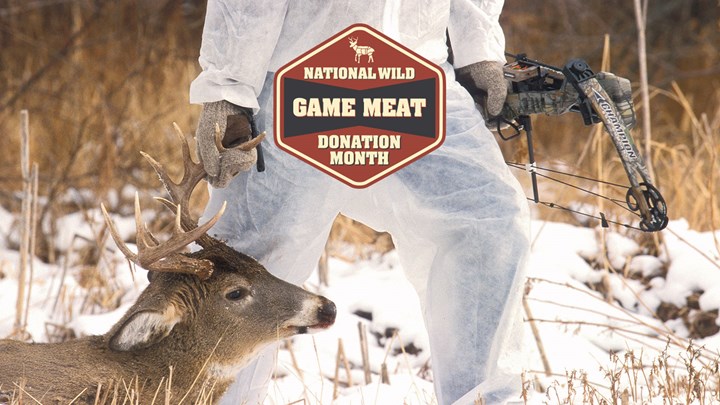
by Joseph P. DeBergalis Jr., Executive Director, NRA General Operations - Wednesday, November 1, 2023

As the holidays approach, we hunters are quick to give back as we continue sharing our wild game harvests with those less fortunate through America’s vital Hunters for the Hungry (HFH) programs. Since the 1990s, hunters, sportsmen’s associations, meat processors, meat inspectors and hunger relief organizations have been organizing state-based cooperative efforts to accept hunters’ generous game meat donations for processing and distribution to needy families. It was during those early years that NRA General Operations launched its HFH clearinghouse to put interested individuals in touch with HFH groups in their own communities while fostering public education, fundraising and publicity. Three decades later, the NRA and NRA Hunters’ Leadership Forum (HLF) continue to champion these groups, which now total about 48, including through donating more than $650,000 to support their missions.
Promoting the American tradition of sharing our wild game harvests takes on even greater significance as we work to increase hunting’s cultural acceptance. The NRA continues to do this by promoting the truth regarding non-hunters’ overwhelmingly positive attitudes toward hunting as a food source, a right and a necessary form of wildlife management.
These facts are based on the NRA’s groundbreaking multi-year study funded by the NRA HLF and conducted by Responsive Management (RM) accessing public attitudes toward hunters and hunting. The resulting book, How to Talk About Hunting: Research-Based Communications Strategies, was written for the NRA in 2020 by Responsive Management’s Mark Damian Duda and illustrates how the case for hunting resonates when we explain that hunters and non-hunters share common values regarding our concern for wildlife and that hunting is compatible with the animal welfare mindset. Amid numerous topics covered, the book, as it pertains to HFH, underscores that one of the most effective ways to maintain public support of hunting is to educate non-hunters on what hunters do with an animal once it is harvested. While some non-hunters believe hunting is about trying to take a “trophy,” the truth is that hunters eat 99 percent of their harvested animals and share 20 percent of their processed meat. Help non-hunters understand this by sharing the facts.
For more on how hunters use the meat they harvest, the NRA recently teamed up with Responsive Management again on another HLF-funded research project tracking hunters’ donations of game meat to America’s HFH programs as shown here.

The project entailed two surveys and three focus group studies. The goal was to help the HFH organizations whose missions are to distribute donated game meat to the needy to better understand how to reach more donors and to determine the sheer quantity of game meat donated each year through their efforts.
The first survey—the “Hunters for the Hungry Survey”—was conducted with 36 of the 48 independent HFH organizations. The second survey—“Quantifying Hunters’ Donations and Sharing of Game Meat”—involved 5,005 hunters from all regions of the country who purchased hunting licenses in 2022. The HFH surveys and focus groups were completed to support these independent organizations, which were given the results so they could assess how similar groups are operating and meeting their goals. Data included details on how these groups are funded, whether their state wildlife agencies contribute funding to their programs, how they compensate their processors, and how they communicate with the public. Other data included details on the age of the groups (with 75 percent having been in existence for 16-plus years), the number of their staff and volunteers, how chronic wasting disease (CWD) has affected their efforts, and what factors might increase their success, to name a few of the topics addressed.
An exciting research takeaway is the fact that nearly 2 million pounds of game meat are donated to HFH groups each year. Not only does this represent a nutritious food source that those in need would otherwise do without, but such a figure goes far in promoting hunting’s cultural acceptance. Other key points include the fact that the primary game animal donated for processing is the whitetail deer—no surprise as it is America’s No. 1 big-game animal—and that most groups report they are not receiving enough game meat or financial donations to reach their goals. We must raise awareness of the need for more game meat donations and funding.
The second survey also revealed information that can be used to help expand meat donation programs and provide guidance in developing future communication strategies in support of HFH. For example, the data show that 45 percent of hunters share game meat with friends, family and others they know outside their immediate household. In addition, hunters share or donate approximately 20 percent of all game meat they harvest, with 4.3 percent of hunters donating some or all of their game meat specifically to an HFH organization. Another 2.6 percent of hunters donated some or all of their game meat to an organization notspecifically affiliated with an HFH organization such as a church or soup kitchen, further underscoring the level at which hunters work to make a difference. In addition, nearly 70 percent of hunters agreed that helping to feed others was important to them. As for the reasons hunters gave for not donating their game meat, 78 percent responded that they did not have enough for themselves while 3 percent shared that they did not know where to go to donate meat.
Speaking as a hunter involved with HFH programs in my own community, we owe a big thank-you to our NRA HLF donors for funding the NRA’s valuable research. And now we hunters can continue to do our part this hunting season to support those in need, whether by donating excess game meat or making a financial contribution to a local HFH program. So let’s make November 2023 and every November hereafter National Game Meat Donation Month.
E-mail your comments/questions about this site to:
[email protected]
